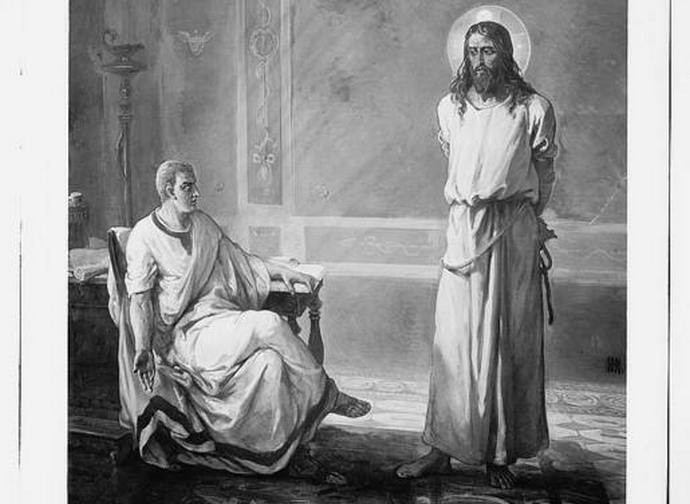The trial of Jesus and the nature of His kingdom
We continue our Lenten journey with Father Cornelio a Lapide's (1567-1637) commentary on the Passion according to the Gospel of Saint Matthew. Jesus' trial begins before Pilate, who dwells only on the third accusation against him. In what sense, that is, is Jesus King? (Edited by Father Konrad zu Löwenstein).

We publish below the fourth text (here the first, second and third) taken from the Commentary of Father Cornelio a Lapide (1567-1637) focused on the Passion according to the Gospel of Saint Matthew. The commentaries of the Jesuit and exegete Cornelius a Lapide, aimed above all at offering help to preachers, are also precious because they contain numerous quotations from the Fathers of the Church and other subsequent exegetes.
Verse 11. But Jesus stood before the Governor. St. Matthew having recorded the fate of Judas, now returns to the main narrative, omitting, however, several incidents, which are to be found in John xviii. 19. It appears from St. Luke xxiii. 2 that the Jews brought three definite charges against Jesus—that He was perverting the people, that He forbade them to give tribute to Cæsar, and maintained that He was Himself a King. Pilate, it would seem, put aside the first two as false and malicious, and dwelt only on the third
The Governor asked Him, saying, Art Thou the King of the Jews? And Jesus said unto him, Thou sayest. He meant by this, I am Messiah the King. He might have said truly, I am not the King of the Jews, I am no temporal King, nor do I aim at being one. But the Jews understood the title King of the Jews to mean the Messiah, and as He could not deny His Messiahship, He confessed that He was the King of the Jews, the promised Messiah.
It will be asked, What is the nature of Christ’s kingdom, and its manifold relations? Christ, then, as man had a twofold kingdom even when on earth.
1) A spiritual kingdom, i.e., His Church, which He instituted as a commonwealth of the faithful, and founded with certain laws, ordinances, and sacraments. He rules it by S. Peter and his successors, as His Vicars, and makes it spread through all nations.
2) Christ, from His very conception, had properly and directly dominion over the world, so as to depose and appoint kings, though as a fact He did not exercise such power on earth. It will be asked whether Christ as man had a human claim to the Jewish kingdom? And I say, He had; for He was the son, the successor, and heir of David. He did not, it is true, enter on His kingdom, nor was He inaugurated as King. But yet He furnished an instance of what He was by His triumph and entry into Jerusalem. He did not actually enter on His kingdom, both because the family of David had long ceased to reign, and the kingdom had by common consent passed into other hands.
And when He was accused of the chief priests and elders, He answered nothing. Because:
- All the charges against Him were false, and deserved not an answer…
- Jesus knew that any answer would be useless, and would only make the Jews more eager for His death.
- For fear He should excuse His crime, and obtain His deliverance, and so the benefit of His death be deferred, says St. Jerome, “for He wished to he condemned through keeping silence, and to die for the salvation of men.” …
- To atone thus for all faults of the tongue, and teach men to keep their tongues from all evil words.
Then saith Pilate unto Him, Hearest Thou not how many things they witness against Thee? For Pilate had brought Him forth from his house to hear the accusations of the Chief Priests, as they would not enter the hall, lest they should be defiled (see John xviii. 28).
And He answered him to never a word, insomuch that the Governor marvelled greatly. Pilate marvelled at His silence in this His extreme peril, when assailed by vehement accusations and clamour. He marvelled at His gentleness, calmness, and contempt of death, and, recognising more fully His innocence and holiness, he laboured the more earnestly to deliver Him. …
Now at that feast the Governor was wont to release unto the people a prisoner whom they would. (There comes in before this verse Luke xxii. 5, which records Jesus being sent to Herod, Pilate and Herod being reconciled, and His coming back again in a gorgeous or white robe. This was the dress of candidates for an office, of royal persons, and also of madmen: Herod mocking in this way at the supposed ambition of Jesus in affecting to be a king.)
Symbolically: The white garment represented the innocence, victory, immortality, glory, &c., of Christ, which He purchased by His sufferings and insults. “Let thy garments be always white” (Eccles. ix. 8). And so S. Ambrose, “He is arrayed in white, in evidence of His immaculate Passion,” and that as the spotless Lamb of God He took on Himself the sins of the world.
Pilate then saw what was Herod’s object in sending Him back, and said to the Chief Priests (Luke xxiii. 14), “Ye have brought this man unto me as one that perverteth the people . . . I will therefore correct Him, and let Him go,” that is, chastise and punish Him, not for His offence (for He is guiltless), but to satiate your rage against Him.
Shortly afterwards he proposed another plan for His deliverance, …This is clear also from the many occasions on which he laboured to save Him.
